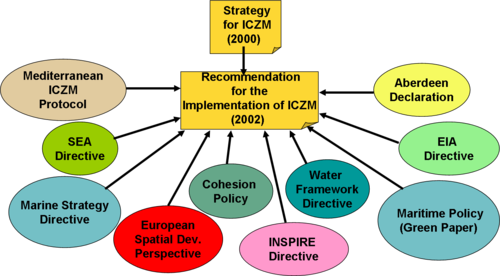EU ICZM policies
This article provides a brief overview of EU ICZM policies in past decades. The article provides links to relevant webpages and could be a good starting point for those looking for information on the subject.
Contents
A brief history of ICZM EU policies
See also: Public participation legislation
Early policies affecting the coastal zone were predominantly issue oriented (e.g. water quality) and reactive in nature. Furthermore the governance of coastal and marine areas has remained fragmented between countries and thematic areas (e.g. sectors) at both national and European level.
Since the 1970s the EU has been dealing with coastal zones through international conventions covering its regional seas. More recently, the EU has begun to specifically address problems related to the state of coasts and the coast as a regional entity[1].
Since 1996, the European Commission has been working to identify and promote measures to remedy Europe's coastal zones deterioration and to improve the overall situation.
The EU Demonstration Programme
From 1996 to 1999, the Commission operated the EU Demonstration Programme on Integrated Coastal Zone Management (ICZM) designed around a series of 35 demonstration projects and 6 thematic studies. This programme was aimed to:
- Provide technical information about sustainable coastal zone management, and
- Stimulate a broad debate among the various actors involved in the planning, management or use of European coastal zones.
The programme was intended to lead to a consensus regarding the measures necessary in order to stimulate ICZM in Europe
In 2000, based on the experiences and outputs of the EU Demonstration Programme, the Commission adopted two documents:
- The ICZM Strategy -COM(2000)547 final
A Communication from the Commission to the Council and the European Parliament on "Integrated Coastal Zone Management: A Strategy for Europe" (COM/00/547 of 17 Sept. 2000)
- EU ICZM Recommendation (2002/413/EC)
A proposal for a European Parliament and Council Recommendation concerning the implementation of Integrated Coastal Zone Management in Europe (COM/00/545 of 8 Sept. 2000). This EU ICZM Recommendation (2002/413/EC) was adopted by Council and Parliament on 30 May 2002.
The Communication explains how the Commission will be working to promote Integrated Coastal Zone Management (ICZM) through the use of Community instruments and programmes. The Recommendation outlines steps which the Member States should take to develop national strategies for ICZM. The national strategies are due for Spring 2006 and should involve all the coastal stakeholders.
Evaluation of ICZM in Europe
Main article: Evaluation of ICZM in Europe
In 2006, the European Commission appointed an ICZM Evaluation Team to carry out an independent evaluation of ICZM in Europe[2].
The analysis of implementation trends has shown that the EU ICZM Recommendation has been beneficial for the coastal management in Europe:
- Creating a new awareness regarding long-term coastal challenges
- Initiating a rethinking of traditional planning approaches towards more sustainable ones
- Creating a strong pressure to increase participative elements in decision-making
|
It is important to note that according to this report, ICZM has shown that it could become the instrument to link 'terrestrial' to 'marine' legislation, especially on a Regional Sea level |
Policy documents for ICZM are the first to recognise three critical areas, namely:
- the importance of land/sea interaction
- the human dimension in coastal processes
- the need to integrate different sectors and stakeholders in order to avoid the type of conflict which leads to unsustainable development[3].
The ICZM Mediterranean Protocol
Main EU policies dealing with coastal areas and its management
Many coastal authorities are engaging in ICZM in order to coordinate the multiple uses of the coastal zones, their impacts and development policies. The coherence of EU policies affecting coastal zones and the integration of the various levels of governance are a pre-requisite for successful ICZM.
There are several integrated and horizontal policies that are not directly aimed at coastal zones but are nevertheless very relevant to the sustainable development of coasts.
- Water Framework Directive (WFD 2000)
- European Spatial Development Perspective (ESDP 1999)
- INSPIRE Directive 2007
Other relevant policies for ICZM:
Quality of Bathing Water Directive (1976, agreed for amendment in 2005
Quality required of shellfish waters Directive (1979)
Further reading
See also The Integrated approach to Coastal Zone Management (ICZM)
See also Capacity Building in the frame of EU ICZM related policies
References
Please note that others may also have edited the contents of this article.
|
